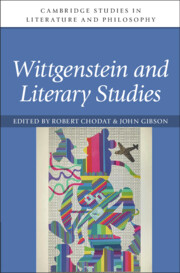Book contents
- Wittgenstein and Literary Studies
- Cambridge Studies in Literature and Philosophy
- Wittgenstein and Literary Studies
- Copyright page
- Contents
- Contributors
- Abbreviations of Wittgenstein’s Major Works
- Introduction
- 1 Writing after Wittgenstein
- 2 A Wittgensteinian Phenomenology of Criticism
- 3 Appreciating Material
- 4 A Vision of Language for Literary Historians
- 5 Wittgenstein and the Prospects for a Contemporary Literary Humanism
- 6 Storied Thoughts
- 7 Wittgenstein and Lyric
- 8 Life, Logic, Style
- 9 Wittgenstein’s Apocalyptic Subjectivity
- Index
2 - A Wittgensteinian Phenomenology of Criticism
Published online by Cambridge University Press: 05 December 2022
- Wittgenstein and Literary Studies
- Cambridge Studies in Literature and Philosophy
- Wittgenstein and Literary Studies
- Copyright page
- Contents
- Contributors
- Abbreviations of Wittgenstein’s Major Works
- Introduction
- 1 Writing after Wittgenstein
- 2 A Wittgensteinian Phenomenology of Criticism
- 3 Appreciating Material
- 4 A Vision of Language for Literary Historians
- 5 Wittgenstein and the Prospects for a Contemporary Literary Humanism
- 6 Storied Thoughts
- 7 Wittgenstein and Lyric
- 8 Life, Logic, Style
- 9 Wittgenstein’s Apocalyptic Subjectivity
- Index
Summary
Can there be something like a “Wittgensteinian” literary criticism? If so, what could it possibly be, given that Wittgenstein sought to make us give up the craving for generality? Through an analysis of “The Avoidance of Love,” Stanley Cavell’s epochal 1969 essay on King Lear, Toril Moi shows that a reader inspired by Wittgenstein does not have to set out to apply a given theory, or to answer certain “Wittgensteinian” questions. Rather it entails a wish to acknowledge the concerns of the text, and respond to them. For Wittgensteinian critics, the text is not an object to be “approached” but action and expression. The critic sets out to answer questions that matter to her, and stakes herself in her own perceptions and judgments in the act of reading. “The problem of the critic, as of the artist,” Cavell writes, “is not to discount his subjectivity, but to include it; not to overcome it in agreement, but to master it in exemplary ways.” To do this requires training. This chapter sets out the implications of all these claims, argues against formalist views of literature and reading, and insists on the fundamental role of human judgment, and acknowledgment in the work of criticism.
Keywords
- Type
- Chapter
- Information
- Wittgenstein and Literary Studies , pp. 41 - 61Publisher: Cambridge University PressPrint publication year: 2023



